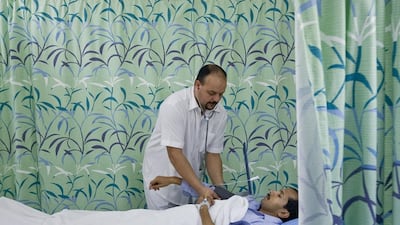The headlines read “Dream hospitals unveiled” and “Residents welcome state-of-the-art hospital”. They show that the UAE health care sector is very much enjoying a boom.
In addition to these new super hospitals, a quick drive through the UAE’s cities reveals scores of smaller private clinics. These smaller specialist facilities usually have eye-catching logos and make emphatic references to other nations: the American centre for this, the German centre for that.
This investment in health care and the partnering with other nations is undoubtedly good news. However, there is an area of health care that is not particularly improved by state of the art equipment, huge facilities or overseas partners – mental health.
The UAE’s commitment to comprehensive health care for all has facilitated the rapid development of a modern health care infrastructure, including mental health services. Prior to the establishment of these, individuals seeking modern mental health care would have to travel overseas. By the 1980s however, there were firm plans in place for home-grown psychiatric services.
According to a report by the World Health Organisation (WHO), Abu Dhabi opened its first psychiatric hospital in 1995. This was initiated on the instructions of the late president, Sheikh Zayed.
This psychiatric facility continues to offer services, and is presently managed by a leading North American health care provider, Cleveland Clinic.
The story in Dubai is similar, where psychiatric care is provided through the purpose-built Al Amal hospital and the psychiatric department at Rashid Hospital. Like Abu Dhabi’s main psychiatric facility, the Dubai hospitals also tend to follow a western – British, Australian or North American – health care model.
While a broken leg is a broken leg in any language, mental health problems take on particularly subtle linguistic and cultural meanings.
Furthermore, the most effective state-of-the-art interventions for many mental health problems rely heavily on language in the form of talk-based therapies. In the case of depression, for example, the most effective treatment is undoubtedly cognitive therapy, a talk-based therapy.
The evidence is overwhelming that compared with other interventions such as antidepressants, cognitive therapy helps people experiencing depression get better quicker and ensures they are far less likely to relapse. Cognitive therapy deals with exploring thoughts and beliefs, and is heavily reliant on language.
However beyond sharing a language, a deep understanding of the patient’s culture is also incredibly important.
An individual’s experience of a mental health problem, how they respond to it and how other people view them, are all profoundly influenced by cultural values.
One man’s social anxiety disorder is another man’s “desirable shyness”. Some psychotherapists go so far as to argue that the most effective therapists are those who best embody their clients’ culture. How many Emirati psychotherapists are there? How many Emiratis experience mental health problems?
The WHO suggests that globally one in four people will experience a mental health disorder at some point. Local experience suggests that mental health problems are not uncommon here.
For example, Qatar’s recently published strategy for metal health – the first in the Gulf – suggests that one in five Qatari nationals are living with a mental health disorder.
The strategy also highlights the massive shortage of professionals working in mental health care in Qatar. For example, there were virtually no psychologists being trained locally. The WHO would expect around 2.15 per 100,000 people in a high-income nation.
There is no shortcut to effective mental health care services, with no opportunity to import from outside. Sending people overseas for treatment might even make matters worse.
Similarly, high-tech equipment might help diagnose problems, but effective psychotherapy is totally reliant on people. If UAE citizens are to benefit from the most effective mental health interventions then there is a clear need to develop and retain Emirati psychotherapists.
Justin Thomas is an associate professor of psychology at Zayed University and author of Psychological Well-Being in the Gulf States
On Twitter: @DrJustinThomas


